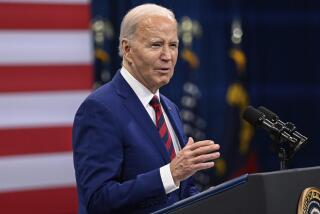Limit on Reagan’s Policy Moves
- Share via
Bruce Fein and Rep. Richard Cheney’s (R-Wyo.) article (Editorial Pages, May 27), “Not Above the Law, But Well Within It,” writing that the Boland Amendment could not constitutionally limit President Reagan’s policy toward Central America, illustrates a puzzling and surprising new trend within the Republican Party.
Several of Cheney’s Republican colleagues on the Iran- contra investigating committee have used their positions to argue that Congress should not and indeed constitutionally cannot “interfere” in the country’s foreign policy. Rather than blame President Reagan for breaking the laws, these Republicans have sought to blame those in Congress wise enough to attempt to hold the executive branch accountable for its conduct of foreign affairs.
The idea that the legislature has no role in international affairs surely would have surprised the Americans who first won our independence. Even before the American Revolution, the English Parliament had won for the legislature the right to approve or forbid government expenditures, both foreign and domestic. This basic principle was incorporated into our own Constitution. Indeed, no issue was as hotly debated in the first Congresses as whether America should support the new revolutionary government in France against its European enemies.
No few Republicans through our history would have been surprised to have been told that Congress must always defer to the President in the making of foreign policy. Sen. Henry Cabot Lodge of Massachusetts led the disastrously successful campaign against President Woodrow Wilson’s policy of joining the League of Nations. Sen. Arthur Vandenberg of Michigan provided advice and support crucial to the success of President Truman’s Marshall Plan and policy of Soviet containment. Sen. Barry Goldwater of Arizona went all the way to the Supreme Court to try to block President Carter from granting diplomatic recognition to Communist China and withdrawing it from Taiwan. Rep. Cheney himself voted to cut off funds necessary to implement Carter’s Panama Canal accord, even after the Senate had already ratified that treaty.
Most puzzling is the Republicans’ attempt to explain the logic of their vision of a President unaccountable in matters of state. The Founding Fathers knew the dangers of a too-weak executive, but they fought a revolution to escape from a too-strong executive. This is why they carefully crafted a Constitution where no branch of government was ever free from the checks and balances of the other branches of government.
Congress must play a role in foreign policy because sometimes, as with President Reagan in South Africa and Central America, the President gets out of touch with the values and beliefs of the American people.
W. HARDY CALLCOTT
Los Angeles
More to Read
Get the L.A. Times Politics newsletter
Deeply reported insights into legislation, politics and policy from Sacramento, Washington and beyond. In your inbox twice per week.
You may occasionally receive promotional content from the Los Angeles Times.










